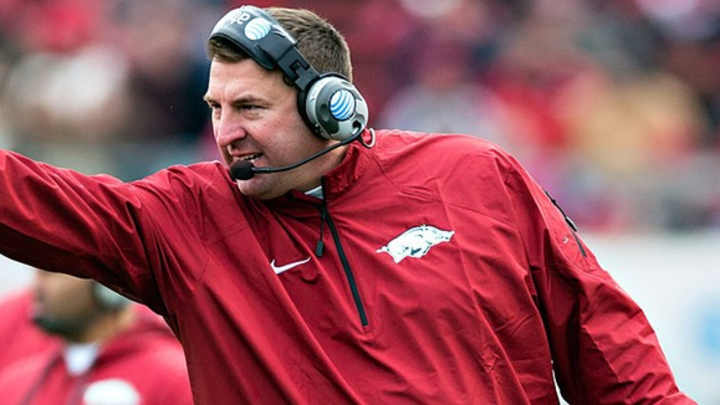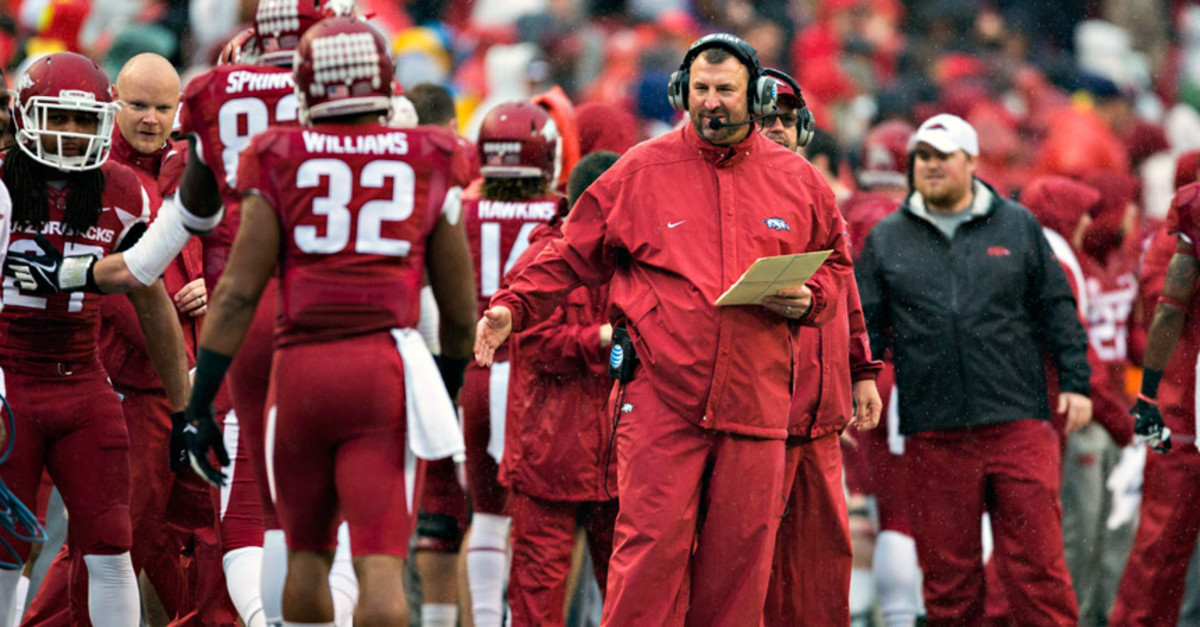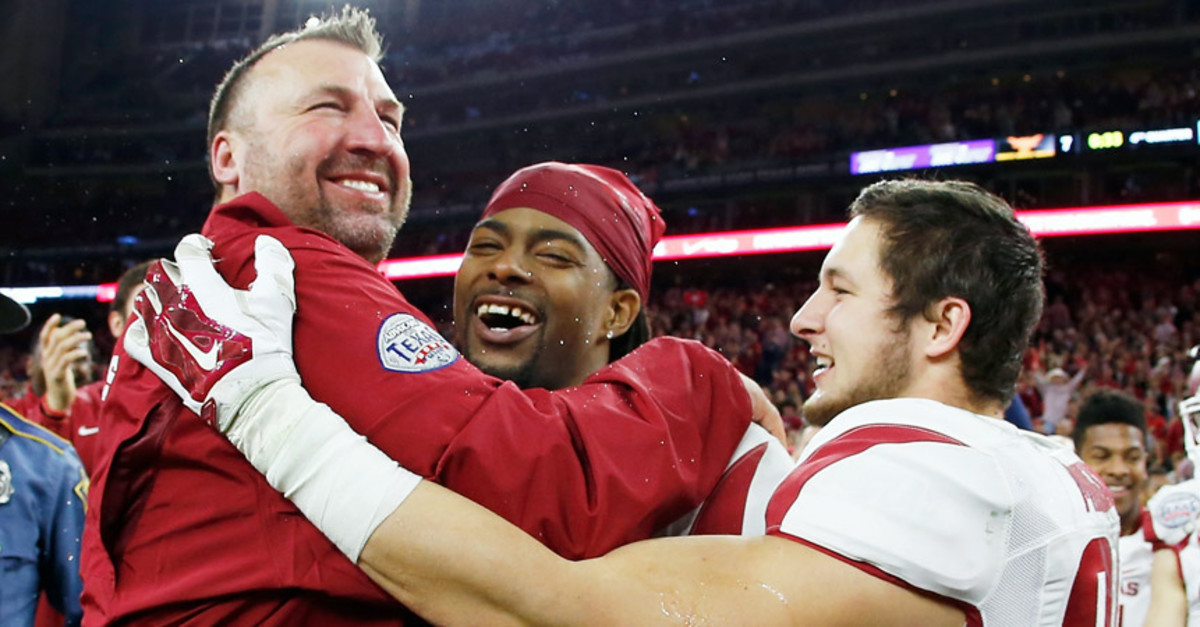Razorbacks, Reinvented: How Bret Bielema changed the football culture at Arkansas

FAYETTEVILLE, Ark.—When former Arkansas coach Bobby Petrino careened his motorcycle into a ditch in the spring of 2012, the Razorbacks program crashed along with him. Details soon emerged that Petrino engaged in an extra-marital affair, hired his mistress for $55,000 and lied to his bosses. Arkansas then endured a year with eight player arrests and a 4-8 record, including a loss to Louisiana-Monroe. The school became the SEC's punchline and punching bag under interim coach John L. Smith.
Three years later the defining symbols of Arkansas football have changed from Petrino's wrecked motorcycle and robotic neck brace to Bret Bielema's doorless Jeep Rubicon and beloved flip-flops. Since Bielema's hiring in December 2012 no program in college football has undergone a more drastic overhaul on and off the field. The Razorbacks have gone from a spread to pro-style offense, from lawless to buttoned-up and from a coach considered to be the consummate introvert (Petrino) to one who is a distinctive extrovert (Bielema). Now the question lingers: Can they go from last to first in the vaunted SEC West?
Arkansas looms as one of the most fascinating teams in college football in 2015; it's No. 18 in the preseason AP Poll and is on the fringe of the national title conversation, yet it hasn't proven it can climb out of the SEC basement. Optimism swells around the program despite a 2-18 record in its past 20 league games and back-to-back last-place SEC West finishes. Still, after going 7-6 in '14 with a "borderline erotic" bowl win over Texas—Bielema's words at SEC Media Days—and shutouts of LSU and Ole Miss, Arkansas's momentum transcends the win-loss column.
The rebuilding of the Hogs links back to Bielema's extensive off-field cleanup. A program with an average of one arrest every 45 days in 2012 has experienced one arrest every 483 days since his hire. After Bielema inherited a roster with cumulative team GPA of 2.2, the Razorbacks enter '15 with a team GPA of 2.8.
Bielema's vision to build a power-football powerhouse at Arkansas hasn't wavered, a Harvard Business School archetype of staying consistent even when results—like a 3-9 debut campaign—didn't immediately materialize. And entering year three in Fayetteville, expectations have changed. With 15 returning starters, including the nation's top offensive line, there's burgeoning hope the Hogs can compete in the SEC despite losing tailback Jonathan Williams to a season-ending foot injury in camp.
How did Arkansas reach this point? Bielema opened the doors of his program for two days this spring to provide a glimpse of the intricacies of instilling a winning culture. From bringing kale into the weight room to teaching lessons about Steph Curry in the meeting room, a belief in paradoxical core philosophies—discipline and fun—emerged. They're the same tenets that allowed Bielema to capture three straight Big Ten titles at Wisconsin, and he plans on using them to win an SEC championship at Arkansas. "I don't know if it's gratifying as much as I just knew," Bielema said in his office in June. "I never flinched. I never felt we weren't going to be able to do this."
*****

Wesley Hitt/Getty Images
The empty hallways around the football offices in the spring of 2013 perhaps best exemplify the sterile atmosphere that accompanied Petrino's tenure at Arkansas. Players only visited Petrino or his assistants when something went wrong. Coaches only pressed players about academics when their eligibility was in jeopardy. The operation was so uptight that even the act of celebrating big plays in practice was frowned upon. "Everyone," Bielema said, "was on eggshells."
No one has ever doubted Petrino's X's-and-O's acumen, as he has won 73% of his games as a college head coach (92-34). But those have come at a price: 21 players were cleared out of Louisville for disciplinary issues following his departure from the school in 2006. Given the Razorbacks' eight arrests from '12 and the 10 players maintaining a GPA below 2.0, Bielema and his staff inherited a similar situation in Fayetteville. "Bret took over a train wreck," former Arkansas defensive coordinator Chris Ash said. "I don't think anyone truly understands the social issues, the academic issues, the things he walked in to."
To fix that, Bielema infused the program with the same duo of strict discipline and positive energy that helped him churn out victories at Wisconsin. He ratcheted up the importance of academics and roamed around practice in flip-flops. He cranked up the intensity of off-season conditioning and also the volume of reggae music in his office. He made players grind to improve in the weight room, but also made a sincere effort to get to know them. His players found his office mentality mirrored his preferred method of driving—doors open. "The coaches were like, 'Why don't you come in our office to talk?'" Williams said. "We were like, 'What?' That wasn't even something we had in our heads we could do."
The more inviting environment came with more demanding standards. In the semester before he arrived, Arkansas players received 21 F's on their report cards. Ash recalled a "culture of worrying about being eligible," which went against Bielema's ideals. "It was ridiculous what they were getting away with it," Bielema said. "Kids, you let them get away with it, they will."
Bielema brought in a new head of academics from Kansas State, Ragean Hill, who senior quarterback Brandon Allen calls the program's "strict mom." Bielema receives a report every afternoon at 3 p.m. detailing which players missed classes and then doles out discipline accordingly. He also meets with the academic staff for two hours each week. As he enters his third season, the culture has embraced accountability: those 21 F's dwindled to five last semester, and the team GPA in summer sessions was 3.0. "For as long as I've been in this business," Bielema said, "guys that have very few issues off the field tend to have very few issues on the field."
Said athletic director Jeff Long, "Those players know [Bielema] cares about them and that's the difference."
*****

(Running back Jonathan Williams) Courtesy of Arkansas athletics
Prior to Wisconsin's 2009 season, strength coach Ben Herbert bought two oversized houseplants from the Home Depot and stationed them in the weight room. One plant's nametag read: "I'm The Governor. I take pride in how I care about myself. I focus on nutrition, hydration and meal frequency." The other's tag read: "I'm The Deacon. What's going on? I've heard all these things about feeding the body well and hydrating, but I've got this far doing it my own way."
Over the next four weeks Herbert fed The Governor heavy doses of Miracle Grow and water. He fed The Deacon cheap whisky, Miller High Life and crumbled bits of Oreos and Doritos. "The Governor shot up and looked beautiful," Herbert said. "And The Deacon looked and smelled so bad that guys were begging me to get it out of the weight room." Herbert's plant parable resonated to such a degree that a few weeks ago a Central Michigan transfer who debuted for Wisconsin in 2009 shot Herbert a message. "I'm in Governor mode," J.J. Watt, the NFL's Defensive Player of the Year, texted after a strenuous workout.
Soon after Bielema arrived at Arkansas in 2012, a player walked into his office who Bielema assumed was a tight end. It was actually his starting left tackle. Petrino's pass-heavy, high-octane offense favored speed and maneuverability over size and power. So, when Herbert arrived with Bielema with instructions to grow Arkansas in the model of hulking Wisconsin, he made sure the Hogs grew like The Governor.
Williams lived on a diet of Taco Bell, Chick-fil-A and Flamin' Hot Cheetos early in his Arkansas career. This spring the senior tailback stashed fresh bread from a local bakery in Herbert's office, packed a healthy lunch at the facility every morning and picked up nutritional tips by going with Herbert on a grocery-shopping trip to Wal-Mart. Williams packed on 12 pounds of muscle to get up to 223, but the superior definition of his frame proved even more notable. "Coach Herbs was talking about Melvin Gordon before he was Melvin Gordon," Williams said. "Seeing those results, if I know he's helped people in the past, I'm buying in."
Nutritional buy-in begins at an elaborate shake bar in the football facility, replete with kale, kiwi and avocado as additives for the players' Generation UCAN energy drinks. (The Razorbacks believe in the shakes enough that they serve them before and during every practice; late last year they began drinking them at halftime of games.) Physical buy-in begins with Herbert's philosophy, which features more squats and less sprints than that of the Petrino regime. The left tackle cannot be mistaken for a tight end anymore, as Arkansas's offensive line averaged 328.4 pounds per man last year. (It was reportedly the biggest in college football and the NFL in 2014.) The Razorbacks return four starters with 74 starts from that unit, which led the SEC with just 14 sacks allowed. This year's Razorbacks will weigh an average of 326.4 with enough extreme makeovers to launch a reality show. Junior Dan Skipper, a 6' 10", 335-pound solar eclipse of a right tackle, weighs 35 pounds more than he did when he arrived. Senior left guard Sebastian Tretola trimmed down to 325 after arriving at 376. (The extra mobility could help him throw a few more touchdown passes to launch another faux Heisman Trophy campaign.)
Herbert also instilled a unique incentive to the weight room, as the program's top four performers—Williams, junior linebacker Brooks Ellis, junior defensive end Jamichael Winston and senior receiver Keon Hatcher—earned invitations into a special Black Room workout. Throughout the summer, only those four were allowed to enter the converted closet where they endured separate, more rigorous workouts than the rest of their teammates. The Black Room serves as motivation for the best workers on the roster, and it features a photograph of Mike Tyson. The accompanying quote doubles as a mantra for the Hogs: "Everyone has a plan until they get punched in the mouth."
*****

(Safety Josh Liddell) Courtesy of Arkansas athletics
Security pounded on the door of the Miami Airport Marriott at 2 a.m. in January of 2014. When Bielema opened it, the hotel personnel suspiciously eyed the room's misplaced desks and tables. Bielema had picked up his old friend, Robb Smith, in Tampa and brought him to Miami to interview for Arkansas's vacant defensive coordinator position. (Ash left to become Ohio State's co-defensive coordinator.) Smith began to demonstrate how he would teach players tackling, and soon enough the room cleared out. "We weren't yelling and screaming," Smith said with a laugh. "But we were coaching, and security was ready to run us."
Bielema hired Smith shortly after, and his addition brought the team more than just one of the country's top young defensive minds. Smith also introduced the concept of teaching a program's language like it's a three-credit college course. He learned the idea from Greg Schiano, whom he worked under as an assistant at Rutgers and then for the Tampa Bay Buccaneers. (Schiano called the language "Chopanese" at Rutgers—after the program's slogan of "Keep Chopping Wood"—and "Bucanese" in Tampa.) At Arkansas, the team adopted "Hoganese," which is essentially a glossary of Bielema's football beliefs and sayings. Twice a week this summer coaches met with players for an hour to teach "Hoganese." "What I want them to understand is we have an opportunity to create our own culture," Bielema said. "And what we've created now through two years has been very positive."
Bielema, 45, showcased that culture while addressing the team at a meeting in June. He posed a question to his players he'd been asked all spring. "Coach, how will your team handle the change in expectations from low to high?"
To the masses Bielema offered a stock answer, usually to laughs: "Well, it kind of sounds like a country music song—'High expectations are better than low expectations.'" But in front of his team, Bielema imparted a strikingly different message: external expectations can't change the internal momentum forward. "The only way you get to where you want to be is if you expect it," he said. "Nobody gives you things. You earn everything because you expect it and you want to get it."
To reinforce that line of thinking, Bielema assigned his team some summer reading: Fearless, a book about Adam Brown, who overcame an addiction to crack to become a Navy SEAL. Despite losing vision in one eye as the result of a shooting and severing three fingers in a Jeep accident, he remained an elite sniper. (Brown happens to be from Arkansas, and his glass eye reportedly featured a Razorbacks sticker.) "Over the course of that book," Bielema said, "the thing that jumped out at me is, time and time again, he's faced with an option of failure and he says, 'No way!"
Bielema also brought up the career collapse of Tiger Woods as a cautionary tale. As a young head coach, Bielema pointed to Woods's play as an example of dominance, execution and peak performance. But Woods's mindset of invincibility changed after his extra-marital affairs came to light in 2009. "All these women come out, he gets dragged through the mud," Bielema said. "Has he won [a major] since? What's the one thing changed in his game? Mentality. Now he doesn't know if he can win. And he's up and down and all around."
Finally, Bielema talked about the underdog story of reigning NBA MVP Stephen Curry, who was lightly recruited coming out of Charlotte Christian School. He attended Davidson, where he led the Wildcats to the Elite Eight, but still slipped to the Golden State Warriors with the No. 7 pick in the 2009 NBA draft. Bielema put up a flurry of Curry's quotes on a projector screen so his team could soak in the overlooked-to-overachiever mindset.
Every time I rise up, I have confidence I'm going to make it.
I'm not that guy that's afraid of failure. I like to take risks. I take the big shot.
I've never been afraid of big moments. I get butterflies, I get nervous and I get anxious. But I think those are good signs. I'm ready for the moment.
"We're a little bit like Steph Curry here at Arkansas," Bielema said. "Not everyone thinks we can do it. The only one that's going to make that decision are the ones that are in here now. If you expect success you'll make it happen."
*****

Scott Halleran/Getty Images
Arkansas's rise has prompted the most fascinating question in college football this season: Who will finish last in the SEC West? There is such a small gap between the division's defending champ (Alabama) and last-place finisher (Arkansas) that a blocked extra point proved the difference when the Crimson Tide edged the Razorbacks 14-13 last October. All seven SEC West teams—Alabama, Arkansas, Auburn, Mississippi State, LSU, Ole Miss and Texas A&M—are ranked in the top 27 of the preseason AP Poll.
Can the last finish first? The case for the 2015 Razorbacks winning the school's first league title goes beyond cultural transformation. Allen is SEC's most experienced quarterback, as he has started 25 games in his career and recorded an impressive 20-to-5 touchdown-to-interception ratio last year. He'll be aided by new offensive coordinator Dan Enos, who Allen predicts will open up the offense to take pressure off the ground game. Though Williams's production will be hard to replace (1,190 rushing yards in '14), 215-pound junior Alex Collins (1,100) and 260-pound junior Kody Walker (174 yards in the spring game) provide solid backfield options.
The hulking offense line, behind 338-pound left tackle Denver Kirkland, embodies Arkansas's identity, and potential All-America tight end Hunter Henry should help compensate for a receiving corps that's among the worst in the SEC. Although the defense returns just six starters, which has led Bielema to nickname the unit "The Bad News Bears," Smith likes the potential of 299-pound freshman tackle Hjalte Froholdt, from Denmark. Plus, the Hogs should be able to find their footing in games against UTEP (Sept. 5), Toledo (Sept. 12) and Texas Tech (Sept. 19) to open the year.
Arkansas has come a long way since Petrino's crash. It looks different, it feels different and it even sounds different. With a refined identity, searing momentum and a nearly a ton of mass on the offensive line, Arkansas's optimism is growing like The Governor. "Why not us?" Allen said. "We can go into any game on Saturday and win every single game."
